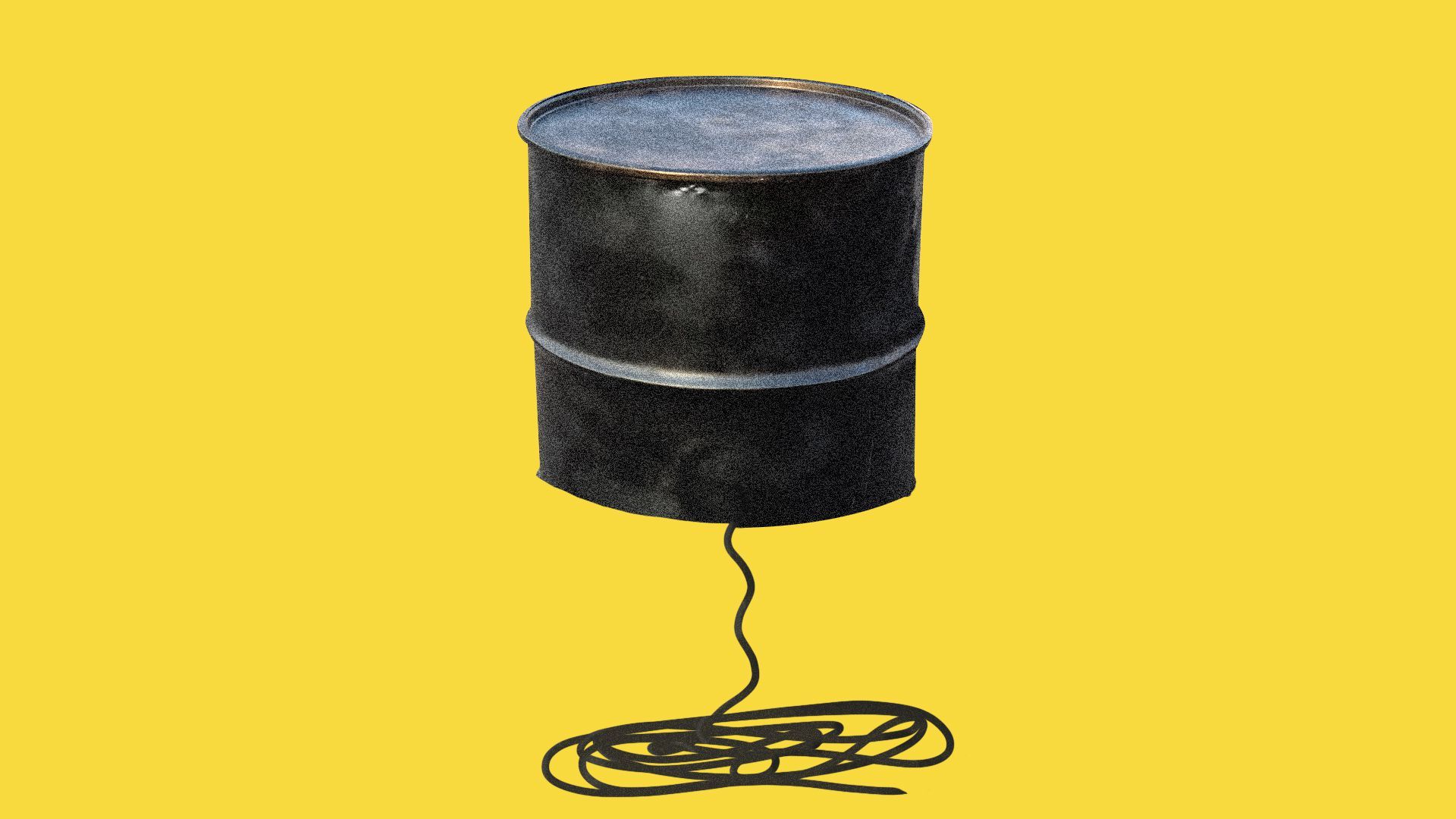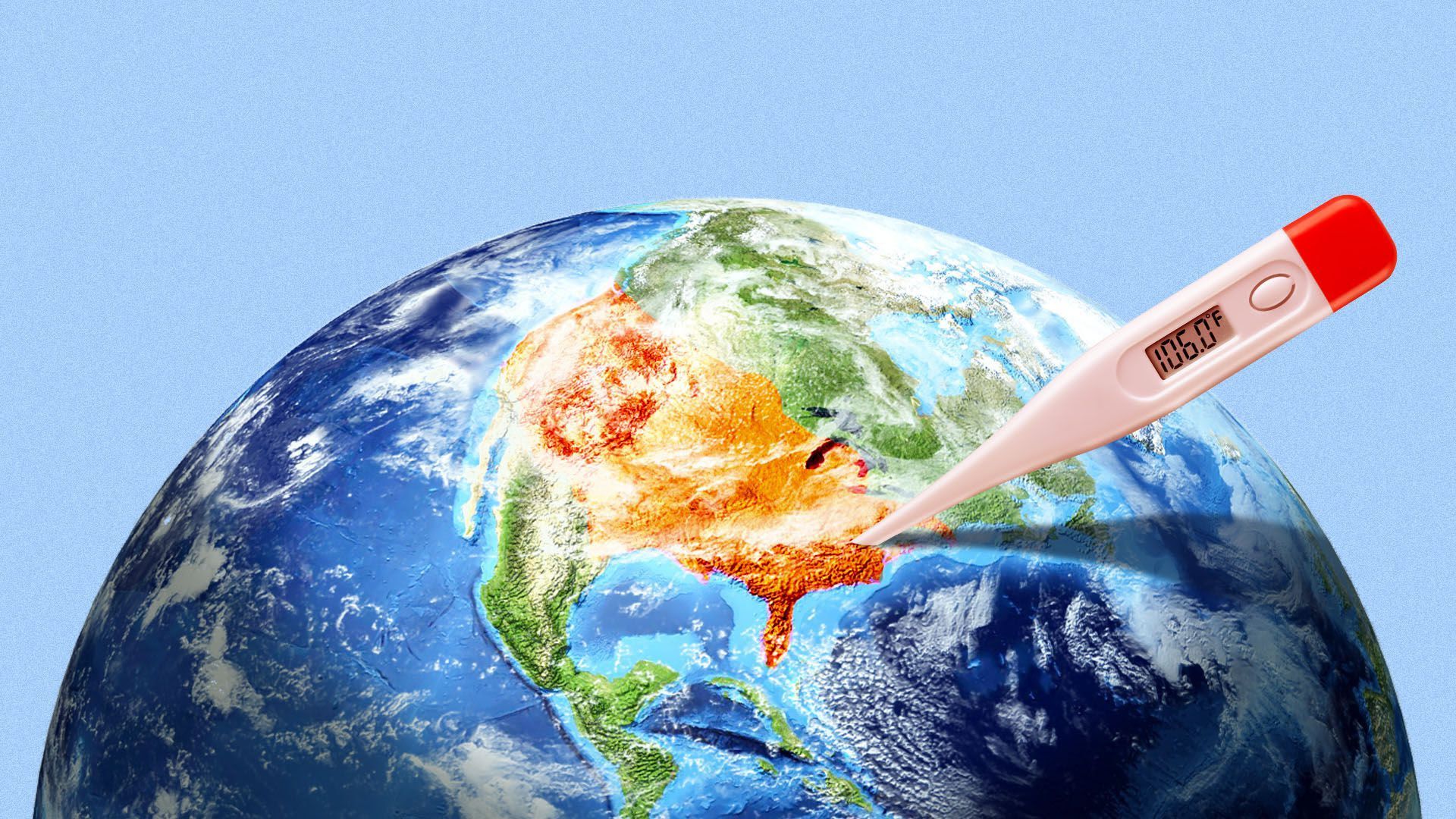| | | | | | | Presented By Chevron | | | | Generate | | By Ben Geman ·Feb 04, 2021 | | Welcome back. Today's Smart Brevity count is 1,250 words, 4.7 minutes. 🎶 This weekend marks the 1984 release date of Simple Minds' album "Sparkle in the Rain," which provides today's intro tune... | | | | | | 1 big thing: Shell's loss highlights Big Oil's tough year |  | | | Illustration: Aïda Amer/Axios | | | | Royal Dutch Shell's earnings report this morning puts an exclamation point on the pandemic's effect on the world's largest oil-and-gas companies. Driving the news: The company reported a full-year loss of over $21 billion, while its adjusted earnings were $4.8 billion, down 71% from the prior year. - "This was a very tough year, let's be honest, and a very painful year," CEO Ben van Beurden tells Bloomberg.
- The company's profit last year was its lowest in at least two decades, per Reuters.
Why it matters: Shell's report follows major losses by Exxon, BP and Chevron as the industry's heavyweights have grappled with the pandemic's hit to oil prices and demand and taken huge write-downs. Where it stands: On a quarterly basis, Shell said the October-December period brought an overall loss of $4 billion, with $393 million in profits on an adjusted basis. - "Fourth quarter 2020 results reflected lower realised prices for oil and LNG as well as lower production volumes and realised refining margins compared with the fourth quarter 2019," Shell said.
The big picture: Industry giants have sharply cut spending and shed jobs as they seek to shore up their finances during the crisis. "We are coming out of 2020 with a stronger balance sheet," van Beurden said in a statement. And via The Wall Street Journal, the CEO said he's optimistic about a continued rebound in demand, including a "much more fulsome recovery" in the second half of this year. What they're saying: The shareholder activist group Follow This, which pushes oil majors to do more on climate change, said Shell's 2020 losses show it should be diversifying more quickly into clean energy. - "If Shell doesn't let the realisation sink in that things are not going well, the company will not fundamentally change, and stay vulnerable," the group said.
- "If Shell had started sooner with the energy transition, then it would not have been hit as hard by this oil crisis," they added.
What we're watching: Shell is slated to provide an update on its long-term strategy on Feb. 11. - Last year Shell pledged to become a "net zero emissions" business by 2050, so we'll be watching for more details.
- In recent years Shell's been increasingly investing in areas like electric vehicle charging and power sector services, but climate advocates say the majors are moving too slowly.
Go deeper: Oil major Shell reports sharp drop in full-year profit, raises dividend (CNBC) |     | | | | | | 2. Oil prices reach their highest level in a year |  Data: FactSet; Chart: Axios Visuals One big reason that oil companies are hopeful that 2021 will be much better than 2020 is the trajectory of oil prices, which continued their recovery with a fresh surge this week (see above). Where it stands: The global benchmark Brent crude is trading this morning in the high $58-per-barrel range, while WTI, the U.S. standard, is over $56 per barrel. Both grades are at their highest in roughly a year. What they're saying: Signs that stockpiles are shrinking and OPEC+ decision yesterday to continue joint supply curbs, for now, are lifting prices. "The oil market is living its best days since COVID-19 became a pandemic as oil supply and crude storage filling rates, that were of major concern during 2020, are now at levels most traders are feeling comfortable with," Rystad Energy analyst Bjornar Tonhaugen said in a note. |     | | | | | | 3. Commerce pick keeps cards close on border CO2 plans | | The Biden administration's nominee to run the Commerce Department isn't ruling out the use of existing powers to impose climate-related trade restrictions. Driving the news: GOP Sen. Ted Cruz asked Gina Raimondo about imposing "carbon tariffs" under existing law. Raimondo responded to the written question — part of the Senate Commerce Committee's vetting — like this: - "I intend to work closely with Congress on the issue of climate change and can commit to use the tools available under the law and work with our interagency partners and other stakeholders to implement the Administration's environmental policies, as appropriate."
Why it matters: One tricky thing in climate policy is how to ensure industries in countries that impose emissions-cutting rules — which Biden is planning — don't face a competitive disadvantage. - Biden's platform vowed "carbon adjustment fees or quotas on carbon-intensive goods from countries that are failing to meet their climate...obligations."
- Such trade measures could also avoid simply moving emissions from place to place.
Yes, but: Biden's platform doesn't say whether he'd seek legislation for the policy. - Kevin Book, managing director of the research firm ClearView Energy Partners, said Biden may have an avenue to proceed using executive power.
- "Biden made climate a national security issue on the second climate executive order and, although we don't yet expect it, Section 232 [of the Trade Expansion Act] allows Presidential import tariffs for national security reasons," he said.
Where it stands: The Commerce Committee voted 12-3 yesterday to advance Raimondo's nomination to the full Senate. |     | | | | | | A message from Chevron | | Chevron is working toward a brighter future | | |  | | | | It's only human to be there when it matters. Last year, Chevron invested billions of dollars to bring affordable, reliable, ever-cleaner energy to people across America. Find out more about how Chevron is working toward a brighter future. | | | | | | 4. More Beltway notes: Interior, NASA, White House | | Giphy Offshore wind: The Interior Department's offshore energy branch said Wednesday that it's reviving the review process for Vineyard Wind, a large planned wind farm off the Massachusetts coast. - Why it matters: It's slated to be the first, or among the first, big offshore wind projects in the U.S., where the sector has been very slow to get off the ground.
Science: The prominent NASA climate scientist Gavin Schmidt is stepping into a newly created position of senior climate adviser at the agency, a sign of the new administration's emphasis on the topic. The Washington Post broke the news. White House: President Biden's top domestic climate official, Gina McCarthy, tells Reuters that the administration is already in talks with the automobile and power industries about planned federal emissions-cutting policies. Congress: Senate Majority Leader Chuck Schumer said on the floor Wednesday that he told the chairs of "all relevant committees" to launch hearings on climate change in preparation for an effort to move "major legislation." Roll Call has more. |     | | | | | | 5. Why the pandemic briefly heated the Earth |  | | | Illustration: Sarah Grillo/Axios | | | | Axios' Bryan Walsh reports...A recently released study finds that curtailed societal activity early in the pandemic also reduced emissions of pollutants that usually act to cool the climate. The big picture: Coronavirus measures brought a sharp, if temporary, reduction in greenhouse gases. But some other pollutants actually act to cool the climate — and with those emissions cut as well, the climate warmed for a few months. By the numbers: Temperatures over parts of the Earth's land in spring 2020 were about 0.2–0.5°F warmer than expected, given the prevailing weather at the time, according to a study by scientists at the National Center for Atmospheric Research. Flashback: Early months of the pandemic brought the sudden appearance of clear skies in usually smog-choked cities like Los Angeles and New Delhi. - It stemmed from sharply reduced driving and manufacturing — in other words, the activities that usually lead to pollution.
How it works: Greenhouse gases like carbon dioxide warm the climate over time because they trap heat, but particles called aerosols released during combustion have the opposite effect, brightening clouds and reflecting heat back into space. - Fewer aerosols meant less of their cooling effect, which temporarily warmed the Earth.
Be smart: The study's counterintuitive results are a reminder of climate action's time-lag problem. - It will take 10–20 years before we experience the very slight cooling of 2020's drop in CO2 emissions, but the warming effect of reduced aerosols was almost instant, simply because the two classes of pollutants have vastly different lifespans.
|     | | | | | | 6. Catch up fast on EVs: Amazon, Ford, Daimler | | Deliveries: "Amazon's new electric delivery vans will hit the road in more than a dozen cities starting this year, the company announced Wednesday." (The Verge) Restructurings: "German carmaker Daimler plans to spin-off Daimler Truck, the world's largest truck and bus maker, as it seeks to increase its investor appeal as a focused electric, luxury car business." (CNBC) Breakups: "Ford Motor has decided to terminate plans to launch electric vehicle joint ventures with China's Zotye Automobile, the U.S. auto giant said on Thursday." (Reuters) |     | | | | | | A message from Chevron | | Chevron is working toward a brighter future | | |  | | | | It's only human to be there when it matters. Last year, Chevron invested billions of dollars to bring affordable, reliable, ever-cleaner energy to people across America. Find out more about how Chevron is working toward a brighter future. | | | | | | Axios thanks our partners for supporting our newsletters.
Sponsorship has no influence on editorial content. Axios, 3100 Clarendon Blvd, Suite 1300, Arlington VA 22201 | | | You received this email because you signed up for newsletters from Axios.
Change your preferences or unsubscribe here. | | | Was this email forwarded to you?
Sign up now to get Axios in your inbox. | | | | Follow Axios on social media:    | | | | | |







No comments:
Post a Comment